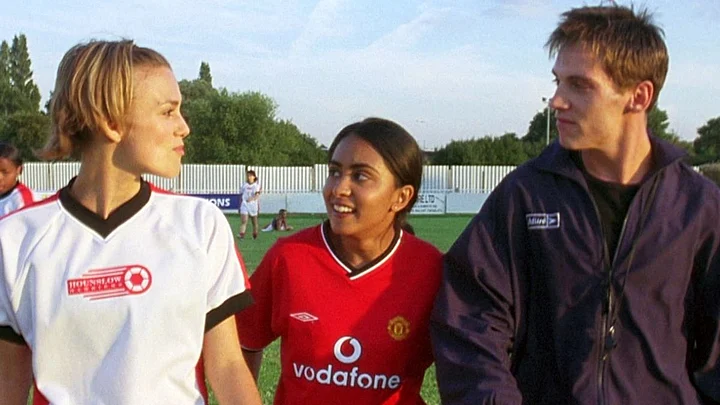Gurinder Chadha’s Bend it Like Beckham (2002) enjoys the status of a cult classic. So it’s no wonder a slew of articles have popped up celebrating its 20th anniversary. And rightfully so.
The film challenged stereotypes, explored cultural dynamics and familial expectations while navigating South Asian representation. It follows the story of Jesminder “Jess” Bhamra (Parminder Nagra), who starts leading a double life to balance her own need to play football while her family demands that she have more feminine pursuits. It’s the age-old tale of overbearing South Asian parents touting their need to control their children’s life as good parenting.
But although the film might come across as a flaky coming-of-age romantic comedy, it’s much more than that. Mostly because the film represents South Asians as more than just snake charmers immigrating from a white man’s very own spiritual mecca, India. A point painstakingly highlighted in Indiana Jones and The Temple of Doom, (1984) which delineates a white man’s saviour complex. It parrots a general disregard for cultural accuracy while poking fun at religious and cultural beliefs to incite cheap laughs, like so many other Hollywood films.
The same can be said about the Simpsons’ character Apu. Created in 1990, it was criticised for perpetuating racist stereotypes of the Indian community. Hari Kodabolu, in his documentary The Problem With Apu, berated the choice of a white man, Hank Azaria, voicing a brown character and seemingly getting a kick out of mocking the “Indian accent.” Contradictorily, Bend It Like Beckham was written and directed by a South Asian woman - a step away from the jarring inaccuracies that seemed to plague South Asian representation written by white men.
Chadha’s film explored not only the dichotomies of the South Asian diaspora but also navigated interracial relationships, queer subtexts and gender stereotypes with humour. Unlike Mira Nair and Deepa Mehta's more serious tonality, who rose to fame around the same time. Much has changed since then, but much remains the same. Although efforts are being made to diversify characters in the western film industry, many of these attempts fall flat.
Priyanka Chopra’s Quantico seemingly brushes over her Indianess as an afterthought. Rajesh Koothrappali in The Big Bang Theory, on the other hand, played into racist stereotypes to elicit laughter. Both these shows portrayed a one-dimensional take on South Asian representation, possibly because they didn’t want to alienate their white audience.
Mindy Kaling’s characters in The Office and The Mindy Project don’t focus too much on the character's cultural background. She actively chooses to keep their Indianness at bay. Never Have I Ever, on the other end, dives headfirst into the Indian cultural context - with an overbearing parent, an overachiever cousin and a bookish but attempting to be sexually active main lead. It’s a South Asian take on the predominantly white American teen drama genre. Albeit, flawed with its sometimes caricaturish representation, it doesn’t shy away from overtly talking about South Asian culture. A welcome change from the barrage of films that represent South Asians only as terrorists or villains.
But a more balanced portrayal of South Asian culture can perhaps be found in Kumail Nanjiani’s The Big Sick. The film navigates the trials of cultural expectations while focusing primarily on the love story between the main leads. The presence of the South Asian context isn’t an afterthought or a stereotype, it adds to the story - refining it. But representation need not always include the positioning of South Asian culture. For instance, Priyanka Chopra’s roles in Baywatch and Isn’t It Romantic or Amita Suman’s role in Netflix’s Shadow and Bone evidence that representation can merely be skin deep, and that’s not necessarily a bad thing. It helps undercut the need to only cast white actors for roles that don’t have fixed ethnicities.
Yet, that mould is also changing, with Dev Patel being cast as David Copperfield in The Personal History of David Copperfield (2019). The Bridgerton (2020) series also did something similar and challenged traditional casting ideals by taking Simone Ashley as Kate Sharma in the lead and introducing the Sharma family. But the new season of Bridgerton brought with it its sense of inaccurate representation and lazy writing. For instance, adding cardamom to Kate’s tea and a ten-second long Haldi ceremony doesn’t seem to do justice to one’s cultural context, which continues to be tokenistic in many cases.
The issue isn’t always colour-blind casting, but balancing the representation of South Asians or any culture - authentically, especially when promising to do so. Bend It Like Beckham chose to create a film with all its tropes, not for a white audience but for an audience in general. It didn't use the character’s cultural context to sound woke but simply told a story of a British-Indian with all its dated plot armours. This gives the impression that authentic representation, then and now, is only possible when the writer’s room is diverse and not only the cast. So despite the continuous need for representation and the increasing demand for it, ignorant writing can only take you so far.
